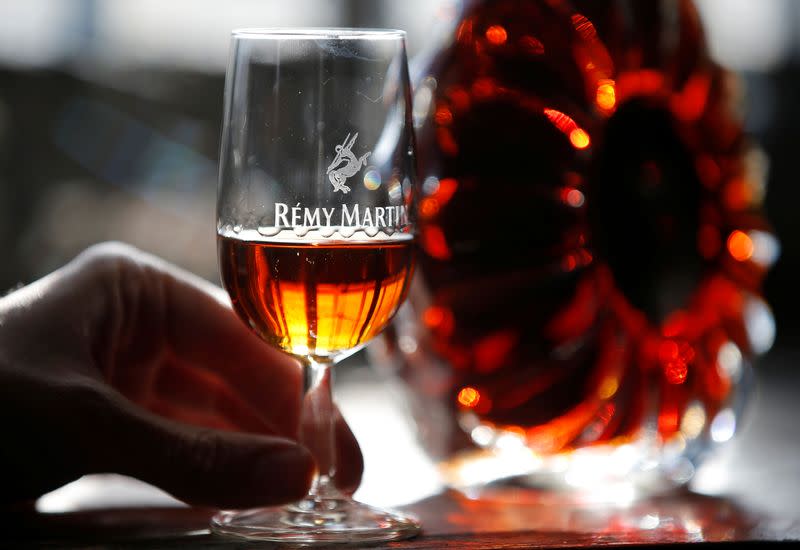Remy Cointreau warns of halving of first-quarter sales due to coronavirus
By Dominique Vidalon
PARIS (Reuters) - French spirits company Remy Cointreau <RCOP.PA> warned first quarter sales would fall by around 50-55% due to wholesaler destocking in Greater China and a sharp slowdown in key European and American markets due to the coronavirus crisis.
The maker of Remy Martin cognac and Cointreau anticipated a "very gradual" recovery in business during the second quarter of its 2020/21 fiscal year, and said it had reopened its French production sites in Cognac on April 14 and Angers on April 20.
Remy-Cointreau's 2020/21 fiscal year started on April 1.
"We have no crystal ball. The second quarter will still be negative but less than the first quarter. The year 2020/21 will clearly be a year of progressive acceleration with strong volatility between months,"Finance Chief Luca Marotta told analysts.
An improvement in consumption during the summer combined with a good mid-Autumn festival in China could see sales and profits recover in the second half.
"This wil be a tale of two halves. Operating profit will remain under pressure during the first half," Marotta said.
In China, where Remy Cointreau makes around 20% of its profits, bars and restaurants were slowly recovering since the end of a lockdown to stop the spread of the coronavirus but karaoke clubs had not yet reopened.
E-commerce, which makes 21% of Remy's Chinese sales, was strong but Chinese wholesalers still lacked confidence.
Remy Cointreau made the forecasts as it reported an 11.2% fall in like-for-like sales to 1.025 billion euros ($1.11 billion) for the 2019/20 fiscal year that ended on March 31, and predicted like-for-like current operating profit would fall by around 25%.
This was slightly better than guidance provided by Remy Cointreau earlier this month of a 12% fall in annual sales and a 25-30% slump in operating profit.
The coronavirus pandemic closed bars and restaurants and halted international travel first in Asia and subsequently in Europe and the United States, during the final quarter of its fiscal year.
To compensate for the hit to its business, Remy Cointreau has cut capital expenditures, non-strategic advertising, travel expenses and promotion spending and frozen hiring and salaries.
In the fourth quarter alone, revenue came in at 210.8 million euros, marking a like-for-like fall of 25.4%, slightly below company guidance issued earlier this month for a 26% slump.
Cognac sales, which make 72% of group total, fell 7.5% over the full year, and 25.2% in the fourth quarter alone.
Cognac sales had a strong year in China despite a drop in demand since January as a result of the epidemic, the group said.
In other cognac markets, sales were hit by a drop in tourism in Hong Kong, and more recently by airport closures due to the virus, while retailers were reducing their cognac stocks in the United States and distribution contracts in Europe also weighed.
Last week, larger rival Pernod Ricard <PEP.PA> said that its key Chinese market was on a slow and gradual recovery since the start of April, reiterating its revised March guidance for an organic decline of around 20% in full-year current operating profit.
(Reporting by Dominique Vidalon; Editing by Sudip Kar-Gupta and Carmel Crimmins)

 Yahoo Finance
Yahoo Finance 

